The CrimeReads editors select their favorite books of the month.
*

Kelly J. Ford, Real Bad Things
(Thomas & Mercer)
Ford’s 2017 novel, Cottonmouths, remains a standout in the suspense category, and she’s back this year with a powerful story of a young woman who confesses to the murder of her stepfather. Rather than going to jail, she carries on with her life, moves away, starts over—because the police never actually found the body. Two decades later, the corpse turns up, and she’s forced to return to her hometown in Arkansas to reckon with her past and what’s left of her family. –DM
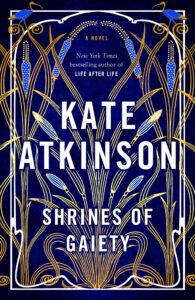
Kate Atkinson, Shrines of Gaiety
(Doubleday)
What could be better than a new Kate Atkinson novel? How about a new Kate Atkinson novel set in the past?!? Atkinson heads to the Roaring 20s for her upcoming literary novel with elements of crime. Shrines of Gaiety explores the peaks and nadirs of life in the demimonde-neighborhood of Soho, where the upper crust rubs shoulders with the down and out and the criminally successful. A perfect companion tale to Fiona Mosley’s well-received story of sex workers in modern-day Soho, Hot Stew. –MO
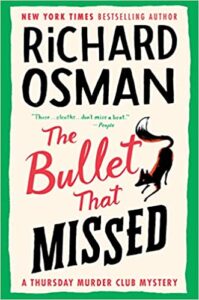
Richard Osman, The Bullet That Missed
(Pamela Dorman/Viking Books)
I adore the first two Thursday Murder Club books with all my heart. If you, like me, have been taxing your patience, crawling up the walls in wait for the next installment, you won’t be in agony for much longer, and your patience will be rewarded. Number Three in the series about the residents of a retirement community who transition from discussing cold cases to solving real murders,might be the most fun book of them all. It’s called The Bullet That Missed, and it sets our beloved Thursday Murder Club members against spies, mysterious assignments, television personalities, and of course, several dead bodies. A hilarious, gripping new tale, it is worth waiting for, and not to be missed! –OR

Jonathan Ames, The Wheel of Doll
(Mulholland)
This follow-up to A Man Named Doll brings much of the same uncanny energy—raw violence, hard-boiled humor—with a new dash of pathos, as Doll goes on the search for an old flame he believed dead. Ames, as ever, plays with the full range of hardboiled tropes and brings out fresh nuances and something really quite startling in this contemporary PI novel. –DM
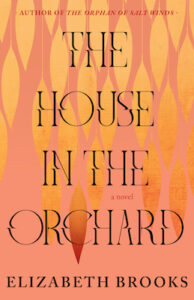
Elizabeth Brooks, The House in the Orchard
(Tin House)
The House in the Orchard is a richly-layered gothic novel with all the psychological penetrations that form is so celebrated for. We follow a WWII widow to a country estate in disrepair, and then a book is found—a young girl’s diary—and soon we’re thrown into another story, of an orphaned child trying to interpret her own trauma and the events of the adult world around her. The result is an exercise in disquiet, just as a good gothic novel should be, and a haunting tale of loss and discovery. –DM
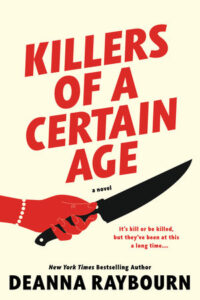
Deanna Raybourn, Killers of a Certain Age
(Berkley)
As the tag-line for this incredible series launch reminds us, women of a certain age may be invisible to society, but sometimes, that’s their greatest asset. As Killers of a Certain Age begins, four trained assassins are readying for their retirement after four decades of taking out terrible people in a most elegant manner. Unfortunately, their bosses have planned a rather more permanent end to their careers than they would like, so the women must go rogue and take on their former employers to find out why they’re been selected as targets. The lively banter between old friends, mixed with plenty of action sequences, will keep you turning the pages long into the night, and I’m hoping these feisty heroines make it to the screen soon to continue their adventures. –MO

Rijula Das, Small Deaths
(Amazon Crossing)
Rijula Das’ sweeping novel of sex workers and the quest for human dignity is bitterly cynical, surprisingly humorous, and astonishingly beautiful. Lalee lives and works in Calcutta’s red light district, where she barely scrapes by. The murder of a popular courtesan is a chance to note the indifference of police, but gives her an opportunity to assume the dead woman’s life and clientage. Will she lose herself in the heady world of the elite? Or will she face dangers that she could never imagine? Why was the elite sex worker murdered, and what did she know about the underworld of human trafficking? And what part in the novel’s explosive conclusion will a bumbling, erotic-fiction-writing patron play? Some novels about sex workers can feel moralistic and exploitative in their brutality; here, we have the opposite—a deeply human portrait of a wide swatch of Calcuttan society working hard to survive and preserve their dignity and community. –MO
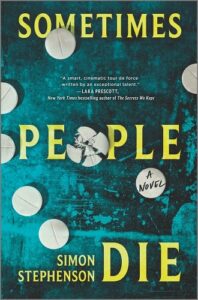
Simon Stephenson, Sometimes People Die
(Hanover)
Simon Stephenson’s diabolical and quick-witted medical thriller is not to be missed, unless you are a person who already has trouble trusting doctors, in which case, do not read this book. But for those of us who are perfectly happy to place our lives in the hands of the medical establishment, Sometimes People Die is a rather hilarious delight. In an underfunded and understaffed hospital, a doctor with a history of opiate abuse has been given a second chance at curing people. Unfortunately, one of his colleagues is more interested in playing god than healing people, and it’s up to the formerly disgraced doctor to find the real culprit for the hospital’s growing number of suspicious deaths, or find himself under investigation. While this book is rather disturbing, an American reading about even the worst parts of the NHS is still bound to be impressed in contrast to our own terribly fraught system. –MO

Lily Anderson, Big Bad
(Hyperion Avenue)
The Buffyverse is back! But this time, with one major twist: Sunnydale is now Demondale, a town where all the Buffy villains coexist in harmony under a permanent night sky. That is, until the Slayer gets transported from her dimension into theirs, and decides she has to destroy their entire world in order to get back to hers. Andrew, Jonathan, Anya, Angel, Faith, the Mayor, and the First Evil—they’ve all got to band together and defeat the slayer, or face the eradication of their own existence and that of everyone they love (or, you know, wanted to murder eventually). Lily Anderson, a self-described superfan of the Buffy franchise, delivers a loving tribute and delightful twist on the characters we all know and love. –MO
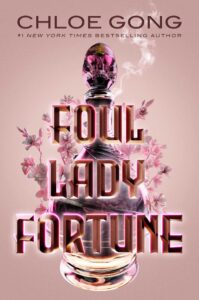
Chloe Gong, Foul Lady Fortune
(Margaret K. McElderry Books)
This historical fiction YA is set in 1931 Shanghai and features two pairs of spies—one nationalist, the other communist—as they go deep undercover and try to prevent the coming Japanese invasion. Chloe Gong adds in magic, romance, and supernatural killings for one of the best cross-genre works I’ve read. A fast-paced, tightly-plotted delight of an espionage novel. –MO

















